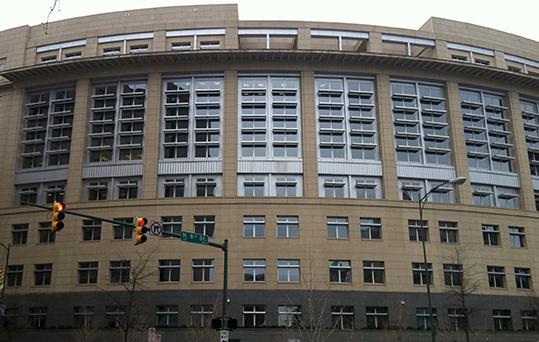A former UVA football player convicted in August for his role in defrauding dozens of investors out of millions of dollars is arguing for a new trial, in part based on a question of whether media coverage of his case may have influenced the jury.
Lawyers for Merrill Robertson Jr., a former L.C. Bird High School football standout and ex-Cavaliers linebacker, argued in court documents filed last week that the “presumed prejudicial effect” of a news article could have seeped into the case and that the judge did not properly vet the jury after its publication to gauge its impact.
The media coverage in question was an Aug. 21 Richmond Times-Dispatch article that stemmed from Judge John Gibney’s decision to revoke Robertson’s bond the day before the jury was to begin deliberation.
The instance occurred toward the end of Robertson’s nine-day trial in Richmond federal court, where he faced charges of mail fraud, bank fraud and money laundering related to a scheme in which prosecutors alleged he and a partner obtained more than $10 million from 50 investors and spent most of it on personal expenses or to repay previous investors.
With the jury out of the courtroom, Gibney reportedly questioned whether Robertson, who had been allowed to remain free on bond, would “run rather than face certain conviction,” the RTD article stated.
Quoting Gibney’s assessment of Robertson: “He is not a truthful person and will do whatever he needs to get out of trouble,” the article stated. “I think there is a strong likelihood that Mr. Robertson won’t come back. The evidence is very, very overwhelming in favor of the prosecution.”
Gibney then revoked the bond and U.S. Marshals took Robertson into custody.
His lawyers quickly filed a motion for a mistrial, arguing there was potential that jurors were exposed to the subsequent news reports.
Gibney denied that motion after polling the jurors about whether they had “heard or read” anything about the case, according to last week’s filings.
Robertson’s camp argues that Gibney’s effort to gauge the jurors’ exposure was “vague and limited.”
“The court’s decision not to declare a mistrial or to sufficiently determine whether any juror had read or heard about the highly prejudicial publicity” was an error, Robertson’s attorneys argue.
Robertson, 36, ultimately was convicted by a jury in Richmond federal court on all 15 counts he faced. He’s set to be sentenced Dec. 6 before Judge Gibney. He faces up to 330 years based on the combined maximum punishment of all 15 counts combined, though the sentence likely will be far less.
Robertson is represented by Patrick Hanes and Jonathan Lucier of Williams Mullen, who are acting as public defenders.
Robertson’s attorneys also filed a motion alongside the new trial request, for acquittal on seven of the 15 the counts.
U.S. prosecutors have yet to file their responses to the motions and no hearing date has yet been set to hear the matters. Robertson remains in custody.
A former UVA football player convicted in August for his role in defrauding dozens of investors out of millions of dollars is arguing for a new trial, in part based on a question of whether media coverage of his case may have influenced the jury.
Lawyers for Merrill Robertson Jr., a former L.C. Bird High School football standout and ex-Cavaliers linebacker, argued in court documents filed last week that the “presumed prejudicial effect” of a news article could have seeped into the case and that the judge did not properly vet the jury after its publication to gauge its impact.
The media coverage in question was an Aug. 21 Richmond Times-Dispatch article that stemmed from Judge John Gibney’s decision to revoke Robertson’s bond the day before the jury was to begin deliberation.
The instance occurred toward the end of Robertson’s nine-day trial in Richmond federal court, where he faced charges of mail fraud, bank fraud and money laundering related to a scheme in which prosecutors alleged he and a partner obtained more than $10 million from 50 investors and spent most of it on personal expenses or to repay previous investors.
With the jury out of the courtroom, Gibney reportedly questioned whether Robertson, who had been allowed to remain free on bond, would “run rather than face certain conviction,” the RTD article stated.
Quoting Gibney’s assessment of Robertson: “He is not a truthful person and will do whatever he needs to get out of trouble,” the article stated. “I think there is a strong likelihood that Mr. Robertson won’t come back. The evidence is very, very overwhelming in favor of the prosecution.”
Gibney then revoked the bond and U.S. Marshals took Robertson into custody.
His lawyers quickly filed a motion for a mistrial, arguing there was potential that jurors were exposed to the subsequent news reports.
Gibney denied that motion after polling the jurors about whether they had “heard or read” anything about the case, according to last week’s filings.
Robertson’s camp argues that Gibney’s effort to gauge the jurors’ exposure was “vague and limited.”
“The court’s decision not to declare a mistrial or to sufficiently determine whether any juror had read or heard about the highly prejudicial publicity” was an error, Robertson’s attorneys argue.
Robertson, 36, ultimately was convicted by a jury in Richmond federal court on all 15 counts he faced. He’s set to be sentenced Dec. 6 before Judge Gibney. He faces up to 330 years based on the combined maximum punishment of all 15 counts combined, though the sentence likely will be far less.
Robertson is represented by Patrick Hanes and Jonathan Lucier of Williams Mullen, who are acting as public defenders.
Robertson’s attorneys also filed a motion alongside the new trial request, for acquittal on seven of the 15 the counts.
U.S. prosecutors have yet to file their responses to the motions and no hearing date has yet been set to hear the matters. Robertson remains in custody.



